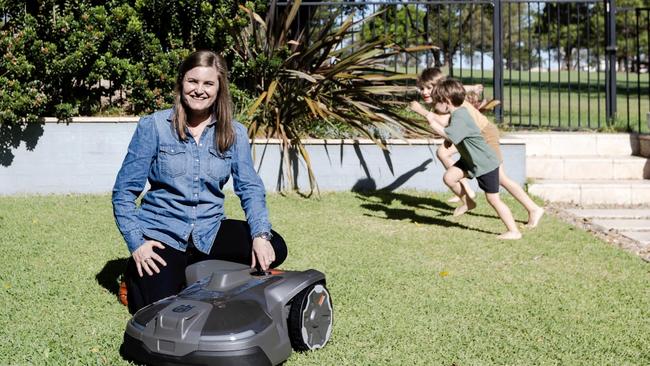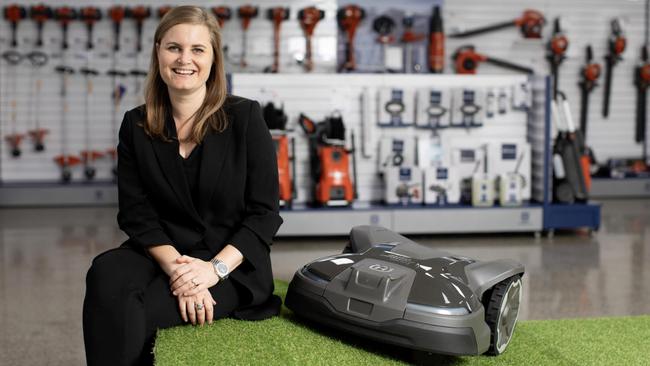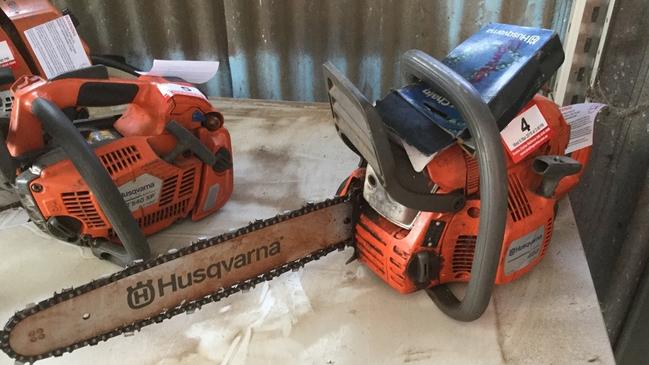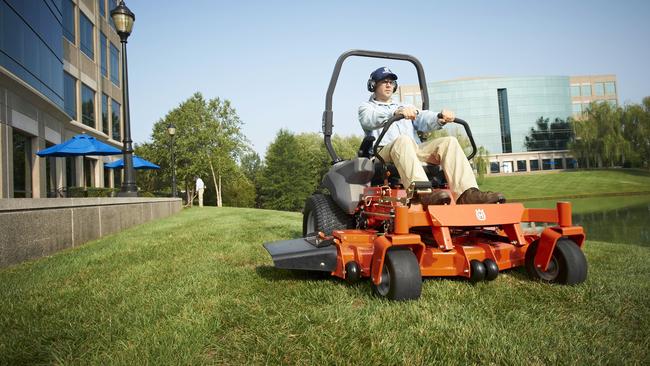Meet the Swede selling Australians AI-powered mowers
Her idyllic upbringing on a Swedish farm riding horses has shaped Husqvarna Australia CEO Pauline Nilsson’s passion for bringing green tech to local backyards.

Anne Nilsson’s picturesque farm is in the southern part of Sweden, near Kristianstad in the Skane County.
With horses in fields surrounded by old stone walls, it exudes a feeling of calm tranquillity and will always hold special memories for her only daughter, Pauline.
“My dad built our house and stable on a hill on my grandfather’s land. It has a fantastic view overlooking the farmers’ fields and my grandparents lived close by,” says Pauline Nilsson, who today runs the Asia Pacific region for The Husqvarna Group, the Swedish manufacturer of outdoor power products which turns over nearly $8bn annually.
“I could either take my bike or my horse for a quick visit to their place. It was such a luxury really.”
Her mother, a former teacher, still lives on the property and is the proud owner of a high-tech Husqvarna robotic mower she named after her husband, Ingvar, who died 12 years ago. He was only 61.
“I feel very sad about that; 61 is way too young,” his daughter says.
“Dad first got cancer when he was 25. We should have talked more about that as a family, as I think that the risk was always there that it would return.

“But we kept on living. Sometimes cancer tends to come back and he got it again when he was 59 and died two years later.”
Ingvar Nilsson worked for global consumer goods giant Unilever for many years, often travelling internationally during the week.
For four years he even relocated to another city, returning to his countryside home each weekend and would drive his daughter to her horse competitions.
Pauline says her father provided much for the family in creating a safe haven for his children – she has an older brother named Christian who still lives close to their childhood home – helping them enjoy their horses and exploring the world.
Having left school she faced the choice of pursuing her talent and passion for equestrian events after travelling to America to ride for a competitor in the US equestrian team during her summer holidays, or going to university. She chose the latter.
“Dad was always the one I would call about getting advice when it came to my career,” she says.
“I think I probably got inspired by him and the travel that he was allowed to do, even though I think at that time he was not so keen. He loved to be at the farm and during holidays he wanted to stay at home.
“But I think that he got me curious for sure about other cultures and other experiences. I’ve always been an explorer.”
As a result she studied in Hawaii and Taiwan, completing a masters in business and marketing before working for seven years at the Swedish liquor giant Vin & Sprit – the maker of Absolut Vodka – which was purchased by Pernod Ricard in March 2008.
In September 2013 she moved to Husqvarna, a trademark Swedish brand that has more than 330 years of history.
Founded as a firearms manufacturer in 1689, it is one of the oldest continuously running companies in the world. It was owned by Swedish industrial giant Electrolux for nearly 30 years before being separately listed on the Stockholm Stock Exchange in 2006.
At Husqvarna, Nilsson’s idyllic upbringing on a Swedish farm riding horses and her experiences abroad have shaped her perspectives on environmental consciousness and cultural diversity.
They have helped her bring an international, yet also local, perspective to Husqvarna Australia, where she has been vice-president for three years.
“Giving people access to green spaces goes hand in hand with how I grew up. I think it’s also defined as a basic human need. The importance of access to green spaces was really proven during Covid,” she says.
“So I’m really passionate about spreading access to green spaces across the world.”
While she is proud of her Swedish heritage, she stresses her passion for Husqvarna comes from what the company stands for, not where its headquarters are.
“It is quite important to me that the company comes with a set of values and a way of doing business,” she says.
“Yes it is a Swedish brand, but I am working for a premium, professional brand.”
Embracing opportunity a world away
Nilsson’s appointment to Husqvarna Australia came completely by chance.
After taking very little maternity leave following the birth of her oldest son, Harvey – a rarity in Sweden – four years later she planned to take almost a year off to care for her second son, Curtis, and travel the world.
But after a month in New Zealand and three weeks in Australia in 2020, the Covid-19 pandemic closed in.
Despite she and her British-born partner, Edward Martin – a former member of Husqvarna’s industrial design team – having rented out their apartment back in Sweden, they returned home and to work.
“It was just a total coincidence when my boss said to me ‘You know what, we have a position open in the Pacific, would you be interested in that’?” she recalls.
“You didn’t get to experience your adventure, your plan for your family to travel, but potentially this could work in ours and your favour. So it was a fantastic opportunity that we jumped on.”
The family arrived in Perth in January 2021 to spend two weeks in quarantine at the Pan Pacific Hotel before they could fly to and settle in Sydney.
Now more than three years on, Nilsson reports to the global president for Husqvarna Forest & Garden, Glen Instone.
The chief executive of Husqvarna Group, Pavel Hajman, was once her boss back in Sweden so she knows him well.
The group has 130 staff in Australia and its head office is at Tuggerah on the NSW Central Coast.

She is now focused on empowering five million Australians to make sustainable choices with their lawn care and on cutting emissions by up to 83 per cent compared with traditional petrol-powered lawn maintenance products.
“Our strategy in Australia is very much aligned with the group strategy, and is focused on premium and professional segments, making lawn-care maintenance more sustainable, smarter and connected,” she says.
“Husqvarna is committed to leading the transition from petrol to battery within our industry.
“That’s actually why I relocated to Australia, to be part of driving that transition for the Pacific region.
“We’re on a journey to providing innovative solutions to homeowners and green space professionals, to make their lives or work environment better.”
Husqvarna was the first to launch robotic mowers almost three decades ago. In 2019 it launched a robotic product for homeowners who have “challenging” lawns; manages rough terrain and slopes with an incline of up to 70 per cent.
Every fifth household in Sweden now has a robotic mower and Husqvarna has sold more than 3.5 million robotic mowers worldwide.
Nilsson also recognises the importance of adapting to evolving consumer needs and the role of circular innovation in transforming the Australian turf industry – reaching city parks, golf courses and public spaces across the country.
The group recently launched a solution for large-scale turf management called Husqvarna CEORA, that it believes will change lawn mowing for larger areas due to its capability to cover lawns up to 75,000 sqm and the precision to reduce cutting heights down to 2-3cm.
She now sees the future of lawn mowing in more autonomous solutions using artificial intelligence to power even smarter and better connected robots.
For example, Husqvarna’s Automower Connect app makes it easy to control and monitor a robotic mower from a smartphone using a Bluetooth, Wi-Fi or cellular network
“We will be able to provide our end users with more information, such as lawn quality and level of moister in the soil, so that our customers can be even more efficient with their use of water,” she says.
The future is electrifying
Husqvarna’s commitment to shift from petrol to battery is just as relevant for handheld tools.
It has just launched a new range of tools for homeowners called Husqvarna Aspire, where a single battery can be used to power not only Husqvarna tools, but those offered by brands such as Bosch and Gardena.
It flows from The Power for All Alliance, one of the world´s largest cross-brand battery alliances that was co-founded by Husqvarna, through its Gardena brand, and Bosch in 2020.
“We have a clear set of must win battles and driving ‘batterification’ is one of these, together with leading the robotics market. The use of smart technology is a big part of accelerating that transition,” Nilsson says.
In 2015, 11 per cent of Husqvarna’s motorised products were running on electricity. Now it is close to 40 per cent and the aim is to reach 67 per cent by 2026.
The group has already reached its goal of reducing its global carbon footprint by 35 per cent by 2025.
Importantly, unlike many garden power-tool products from China and other parts of Asia, the Husqvarna range is only sold through specialist dealers which also carry spare parts and accessories and have workshop staff trained by the company’s technicians.
Like other European garden-tool brands such as Stihl and Bosch, Husqvarna has prided itself on remaining below the radar in Australia, letting the quality of its brand speak for itself.

Their local executives have rarely done media interviews. But Nilsson’s decision to buck the trend indicates she wants that to change.
“I think maybe we need to make ourselves more known. Many people in Australia are probably not aware of digital and robotic mowing as an alternative, so we need to really work on that cause,” she says.
She is in no hurry to return to Sweden, having now settled her family in Australia.
Of course the family has its own robotic mower, which Nilsson operates using an app on her phone. Her children have named it “Racer”.
At 41 years of age, she is proud of having worked and studied internationally now for more than two decades.
“For me personally it is important to be able to build bridges between cultures. To be able to be relevant and make a real impact, you need to be able to collaborate across cultures and show a genuine understanding for others and be able to motivate actions that work for everyone,” she says.
“It is especially relevant if you work in an international context.”
One day she hopes her children can follow in her footsteps, as she did in those of her own late father, having the courage to take on the world – without the fear of failure.
“My theme that I hope I can give to my children is to do work in the international context,” she says.
“The more you can build bridges between people and collaborate across cultures and inspire action, the better.”






To join the conversation, please log in. Don't have an account? Register
Join the conversation, you are commenting as Logout